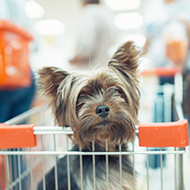
Customers will be required to keep their pets on a lead while in-store.
High street retailer Wilko has announced that it will be allowing dogs into 248 of its UK stores.
Announcing the news on its Facebook page, the company said: ‘A pet is more than just a pet, they’re family. That’s why we’ve decided to welcome pets in-store at 248 of our locations.
‘We hope that shoppers will enjoy bringing their furry friends along with them. Please check for new signage at the entrance of your local store to see if they are participating.’
Customers will be required to keep their pets on a lead while in-store and must clean up after them ‘if they have a toilet mishap’. The retailer has also asked owners to ensure their pets are well-behaved and kept away from the food aisles, except for service dogs.
The move comes amid the recent rise in pet thefts, with the Police warning dog owners not to leave their pets tied up outside shops for fear of criminals cashing in on the demand for ‘lockdown puppies’. It also follows similar decisions by John Lewis and Metro Bank, who are also allowing pets into their stores.
Welcoming the decision, one pet owner wrote: ‘What a brilliant idea! I really don't like being among loads of people so having a few dogs about will make me feel much more relaxed.’ Another said that it will mean they no longer have to worry about their dog getting stolen.
However, some expressed concern over behaviour, hygiene, allergies and pet phobias. One service dog owner commented: ‘As a Guide Dog user I think this is a rather ill-thought-through idea. It’s hard enough navigating around the shop to begin with, then adding extra distractions of other animals it could end in disaster.”



 The Veterinary Medicines Directorate (VMD) is inviting applications from veterinary students to attend a one-week extramural studies (EMS) placement in July 2026.
The Veterinary Medicines Directorate (VMD) is inviting applications from veterinary students to attend a one-week extramural studies (EMS) placement in July 2026.